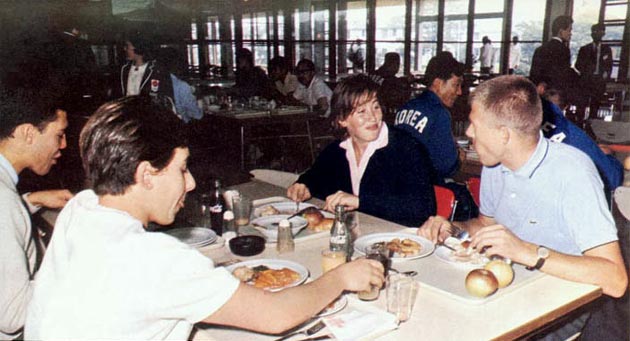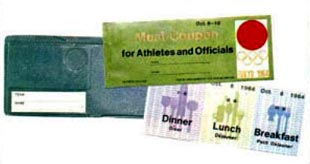The food supplied for the athletes at the Olympic Village needs to cater to a diversity of sports, cultures, ages and special dietary needs. Here is some information about the Olympic Village food menu for Tokyo in 1964. See more about Olympic Village nutrition and links to information about the food supplied at other Olympic Games.
1964 Tokyo Food Halls
The Japanese Olympic Committee decided to request the services of the Japan Hotel Association of which the leading Japanese hotels in Japan are members, to provide the expertise in catering to international clients on on a large scale.
The Association was required to assist in the preparation and serving of food and beverages, procurement of cooking utensils and tableware, organise the storage of supplies, and manage food hall employees.
Two main dining areas were operated, the men's quarters where two dining halls (Fuji and Sakura Dining Halls) with a capacity for about 1,000 persons, and the women's quarters with a seating capacity for 230 people.
 Athletes enjoying a meal at the Olympic Village food hall
Athletes enjoying a meal at the Olympic Village food hallfrom the Olympic Games Official Report Tokyo 1964
Up to 7,000 athletes and officials representing 94 countries, each with different dietary customs and preferences, were required to be fed. A meal coupon system was used. Standard menus contained at least 6,000 calories and the cafeteria system allowed a free choice of food. Regular menus were prepared which included a wide range of internationally accepted dishes and special menus containing dishes characteristic of each country.
Food Menus
The dining halls were operated in cafeteria style. Salads, cold dishes, hot dishes, fruit, tea, coffee, juice, etc. were served at the counter. Milk, ice cream, water, etc. were kept for free service in the various coolers in front of the counter. Each athlete or official entering the dining halls was required to submit his or her meal coupon at the front desk.
The standard breakfast included: Orange juice, Tomato juice, Pineapple juice, Grape juice, Grapefruits juice, Milk, Cocoa, Coffee, Tea, Sanka coffee, Oatmeal, Corn flakes, Toast, Breakfast rolls, Jam, Butter, Marmalade, Eggs, Bacon, Ham, Sausage, Cheese, Cold meat.
 food hall meal coupons
food hall meal couponsfrom the Olympic Games Official Report Tokyo 1964
for Lunch and Dinner:
- Hors d'Oeuvres and Cold Buffet: Ham, Sausage, Corned tongue, Stuffed eggs, Tuna fish, Oil sardine, Fish salad, Combination salad, Chicken salad, Roast beef, Roast chicken, Roast veal, Roast lamb, Roast pork, Tomatoes, String beans, etc.
- Potages: Consomme, Veloute, Creme, Vegetables, etc.
- Fish: Prawns, Salmon, Halibut, etc.
- Meats: Beef, Mutton and Lamb, Chicken, Pork
- Vegetables:
Potatoes, Tomatoes, Cabbage, String beans, Green peas,
Spinach, Celery, Beetroots, Carrots, Mushrooms, Cucumber,
Onions, etc. - Fruits: Mandarins, Apple, Banana, Pear, Grapes, Lemon, etc.
- Desserts: Fruits pie, Ice cream, French pastries
- Cheeses: Gruyere cheese, Process cheese, Esram, Edam, etc.
- Drinks: Coffee, Tea, Sanka coffee, Milk
- Breads: Hard roll (French roll), White bread, Rye bread, Rice
- Alcohol: No alcoholic beverages were served, though the athletes could bring some in themselves.
Special Meals:
- Box lunches could be prepared for those who could not eat at their dining hall by reason of their travel to distant Games sites or training venues. Two menus were always available for box lunches, and anybody could take with him a thermos bottle of soup, coffee or tea together with his lunch box (he total number of box lunches served was 6,318).
- A total of 420 athletes and officials received birthday cakes
Support Staff
Some of the delegations brought their own cooks to either do the actual cooking for their athletes or supervise the cooking service in the kitchens. Italy, Germany and Hungary brought a cook with the team, India brought two cooks and France three. The Polish team brought a dietitian.
Related Pages
- Food Provisions at the 2020 Tokyo Olympics
- Olympic Village nutrition, includes links to info about the menu at other Olympic Games.
- Nutrition at the Olympics
- History of the Olympic Games Athlete Villages
- Tips for good nutrition while traveling to Japan
- About the Olympic Games
- Nutrition for Athletes at Major Events
- Sport in Japan


 Current Events
Current Events